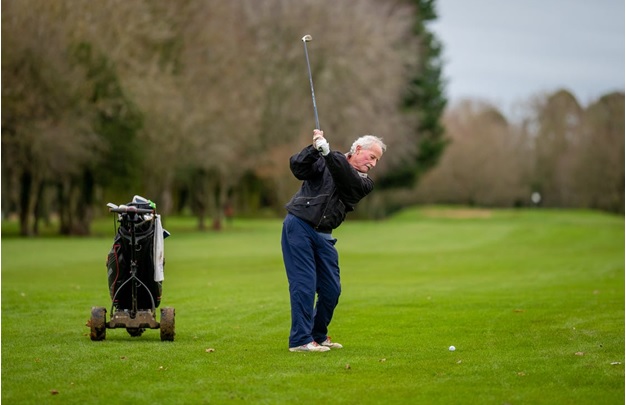Common Shot Errors in Golf: How Practice and Our Driver Shafts for Sale Can Solve Them
Posted by Dallas Golf on 03 Jul 2022

Have you ever heard the expression, “It’s the Indian, not the arrow”? Typically, this quote is applied in situations indicating that fault (or success) should be attributed to the skills of the individual, and not to his or her gear.
In other words, fancy, expensive equipment will not make a pro athlete. Nor can a proficient, experienced individual be substantially limited by sub-par goods.
Golf is one of those sports in which there is great interplay between a player’s abilities and his or her gear. In this case, shot errors can be caused either by the Indian (the player) or the arrow (the gear).
Let’s break down a few common shot errors, what the problems are, and what you can do about them.
Not Warming Up
You might be surprised how many golfers simply don’t warm up before a round. This is a terrible habit because it can have a variety of adverse impacts on your game.
Before a round of golf, take a few practice swings with each club. Start with the lighter clubs like irons and wedges, then progress up towards your drivers. This will help improve circulation to your muscles, stretching and warming them.
Warmed up, flexible, limber muscles are vital to strength and control - which impacts distance and accuracy.
Death Grip
If you’ve got your driver in the vise-grip of the jaws of life, you’re asking for trouble.
A golf swing should be smooth and fluid. You can’t do anything smoothly and fluidly if you’re using every ounce of effort to keep your muscles tight. No one’s going to rip the club from your hands. Loosen up!
Bad Posture
Bad posture isn’t just one single thing. There are so many ways your stance and distance from the tee can be off, and all of them can throw a big wrench into your swing.
Two of the most common problems are hunching or slouching forward over the tee and standing too erect, almost leaning away from it. Neither one of these is good.
Hunching over will make it difficult for you to pivot during the swing and can cause you to underestimate your distance from the tee, causing fat shots that can damage your clubs. The opposite, leaning too far back or standing too stiffly and erectly, can also cause accuracy issues.
Assume a consistent, proper posture and practice maintaining it. Bend forward only slightly, with your knees barely flexed (but not bent) and your weight shifted towards the balls of your feet, but still balanced.
Slices: Hitting the Ball with an Open Club Face
A tight grip is not good. A weak grip is hardly better. Failing to keep your club’s butt surely gripped can cause the club face to contact the ball while “open,” which will cause a slice, causing the ball to veer off to the right (for right handed golfers).
This can happen when a player grips the club weakly and in such a manner that his or her lead hand (the left hand, for right handed golfers) is rotated toward the ball. This is where the problem arises.

The solution is simply to take a slightly firmer grip while rotating both hands (but most importantly, the lead hand) slightly away from the ball. This should help to close the club face through the swing, reining in slices and pushes.
Trying to Swing Too Hard
Accuracy and distance in golf don’t come from trying to swing hard. They come from developing consistent form and sweep, which results from accelerating through the downswing. Accelerating at the right time is good and can add yards to a shot; trying to swing too hard can cause errant ball flight and will do little to extend range.
Yes, higher club head speeds at contact do result in longer shots, but if you’re putting every ounce of muscle into trying to force the swing, you’re not going to be able to control the club face at impact. Stability and energy transfer will suffer.
Work first on proper form, then on acceleration through the downswing - not just on trying to be faster.
Swinging Off Balance
Swinging off balance is a recipe for disaster. Sometimes, swinging on uneven ground is unavoidable, but never do so unless your stance is firmly planted and you are well balanced. On even ground, practice consistently swinging and have a friend or trainer observe you to ensure you aren’t leaning forward, backwards, or to either side.
Overswinging
Overswinging occurs during the backswing, if the backswing extends the shaft past the point that it is parallel with the ground, at which point the shaft will be pointed back down at the ground. At transition, the shaft should never move past a parallel orientation with the ground.
Overswinging will rob your swing of power and distance. Unfortunately, it can be difficult to tell on your own whether you’re overswining or not. A friendly observer or trainer can help with that.
Using the Wrong Clubs or Shafts
This is a case in which it is the arrow, not the Indian. Using golf shafts that are not properly mated to your abilities can cause a very wide range of problems.
Chiefly, the shaft flex and related factors, like torque and kick point, are the main culprits in shaft suitability.
Players with higher swing speeds tend to prefer stiffer golf shafts with lower torque ratings and higher kick points. These shafts are feel more responsive to most experienced players.
Conversely, players with slower swing speeds tend to gravitate towards shafts with higher flex ratings and lower kick points. The higher flex rating makes it easier for a slower swing to load the shaft with energy, and the lower kick point adds height to the launch profile.
However, this is not a hard and fast rule, and before you commit to one of our driver shafts for sale to rectify a perceived performance issue, it’s best to work with a professional for golf club fitting services.

Game Up: Explore Our Driver Shafts for Sale
Take a look through our collection of driver shafts for sale if you feel that your problem has more to do with your equipment than your training. We carry highlights from the top manufacturers, including but not limited to Mitsubishi, Fujikura, Aldila, Grafalloy, and countless others.
Check them out today and get in touch with our professionals by phone at 800-955-9550 if you have any questions.
